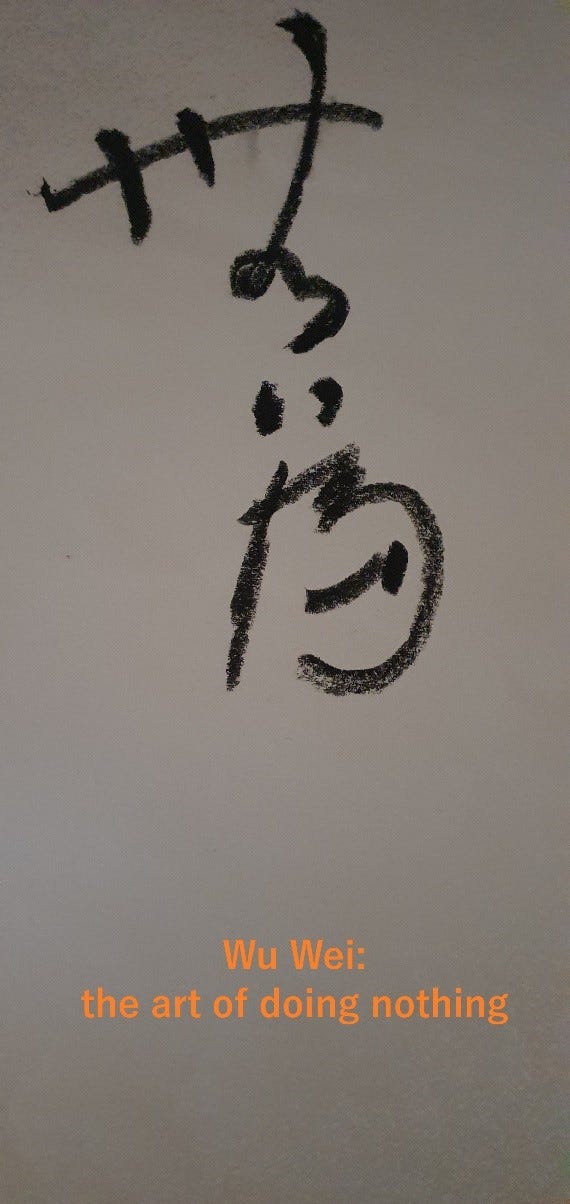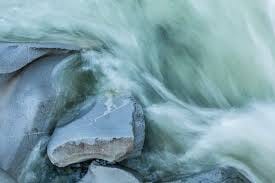There is a numinous [mind] naturally residing within [有神自在身];
One moment it goes, the next it comes,
And no one is able to conceive of it.
If you lose it you are inevitably disordered;
If you attain it you are inevitably well ordered. (source, Wu Wei, Wikipedia)
In Chinese Confucianism and Laozi-ism (not to be confused with ‘lazyism’), the paradox of inaction is at the center of a polemic, a clash with western philosophy. But 6th century BC Lao Tsu’s concept catches up …
PARADOX is etymologically what is outside the known domain or ‘doxa’.
Whatever you are not doing, it’s always something. Something is always happening. So how does ‘doing nothing’ work? What exactly is the art of doing nothing?
The science
At the heart of Wu wei, is the art of letting things happen. Tantamount to inexertion, inaction or being at the centre of a world where you have no control over anything. It’s unsettling at first. The idea that you are not at the center of a world of you own volition, is against the laws of human nature. For example, posting on social media without saying anything new or exciting, or particularly relevant to this day is unthinkable.
Yet, many people do it. They might pretext a comment on a piece of news, a celebrity. Hell, they might post the picture of a cute dog . But really, what they’re trying to do or say is ‘notice me’, ‘see me’, ‘I am here’ or ‘Don’t forget about me’.
This new-fangled self that they create, follow-up with fluffing endearment or re-create under layers of universality feeds on love and the need thereof.
Other terms for the science of not doing anything can be ‘non-action’, or what some describe as ‘observing the numinous’ part of our existence, where only the here and now matters. In order to actually invent or highlight something meaningful for humanity that is not attention-seeking or ingratiating is not even the point of Wu Wei.
It’s thrilling to know that doing nothing is actually good for you. Simple enough, the ambition in ‘doing nothing’ is to see what comes up in your psyche.
Medically speaking, human beings have an autonomous nervous system. The heart beats without any effort (hopefully, if you’re healthy) and life just flows.
One element of Wu Wei is the willingness to relinquish control.
As a psychology post-graduate in spiritual and transpersonal disciplines, I practiced doing absolutely nothing. It takes discipline, you just try.
Come to think of it, breathing is not even an action in itself. Try and not breathe and you’ll see (I tried not breathing once in my student’s flat a while ago. I nearly managed but I ‘supervised’ my experiment so that it became a transcendental experience, call it extreme yoga. In any case, it’s impossible to stop breathing consciously. There were other factors at play, and I managed to connect to what is called the peri-natal matrix, but that’s another story).
In Wu Wei, what is important is the ‘numinous’ part of the experience and what you can achieve by letting go of the vicissitudes of your body reacting to elements: light, sounds, gravity or emotional states.
Doing nothing takes courage. To do nothing takes guts and courage. But more importantly, it takes skill.
But once you succeed, the mind opens to the domain of the unseen and abstract. There’s a learning curve to doing nothing …
Doing nothing could be a religion if it wasn’t already institutionalized as laziness.
But what does ‘numinous’ mean?
It refers to the world of dreams, and mainly whatever is not conscious, spiritual (although the spiritual can be conscious, hence people like me qualify from esoteric institutes).
Doing nothing is more than a dream. It’s a necessity.
For me Wu Wei is best exemplified by the water and rock analogy.
Water flows around the rock. It is fluid and malleable. In the end, what appears as wild, expandable and chemically unstable, such as water, is the real power that eats away at solid tangible concrete rocks.





